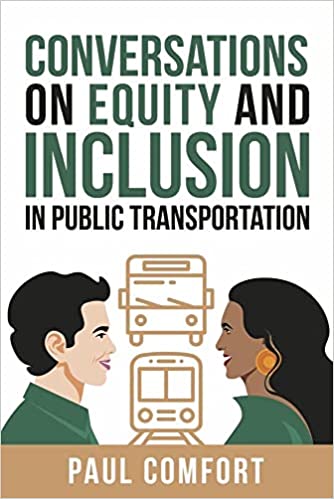Paul Comfort, Conversations about Equity and Inclusion in Public Transportation, Comfort Consulting, 2022

Paul Comfort is a transit evangelist (his term) and the former Executive Director of Maryland Transit Authority, which covers greater Baltimore. He’s become known especially for his Transit Unplugged podcast, which interviews transit industry leaders (including me). He is, as you’d expect, an upbeat guy, keen to talk about successes, build morale, and help agencies learn from each others’ experience. And while his audience is mostly transit professionals, it can be interesting for advocates to listen in on these conversations.
This new book is a collection of his interviews, mostly with the people leading major transit agencies in the US. The book certainly does touch frequently on the title’s topics, equity and inclusion, but it’s also just a good overview of how many leading figures in the industry are seeing their situation in 2022, as we begin to sort out both the legacy of the George Floyd protests and the “new normal” of working life and travel patterns post-pandemic.
The book is a good tour of what’s on the minds of the industry right now, at least in the US. (One Australian leader is interviewed, but she talks mainly about hiring and workforce diversity, not transit policy or operations.) Zero fare programs, demand-responsive transit, and customer service innovations all come up repeatedly. Now and then, you’ll also get hints of debates about the definition of success. How much does ridership matter right now? What do communities really want from their transit agencies? And to come back to the title: What is equity, and can we measure it?
Obviously, senior executives know how to sell their agencies, so some of what you read will sound like vague feel-good pitches. You may be frustrated that so few of these leaders dig into the details of policy and planning problems. (Noah Berger of Merrimack Valley Regional Transit Authority, in northern Massachusetts, is a fun exception).
But even then, it’s good to see what transit leaders are being expected to do, in the political situations they find themselves in, to sustain support for a transit system. A lot of what senior executives do is storytelling: Most are talking to a public, and a decision-making elite, that doesn’t know much about transit, doesn’t use it themselves, and that wonders why they should care. You have to connects the facts to people’s deepest longings for themselves and their community. It’s interesting to watch how some different personalities do it.
I have nothing or no optimism about America’s transit agencies. And when I listen to all this talk that it’s going to get better, I just think that nothing has really been done.